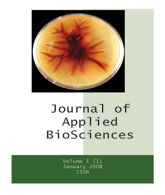Journal of Applied Biosciences (J. Appl. Biosci.) [ISSN 1997 - 5902]
Volume 52: 3704 - 3715. Published April 30, 2012.
Bush meat trade in Makurdi Metropolis; implications for the conservation of wildlife in Nigeria
Tee1 T.N. *, Ikpa2 T.F and Tortange1 V.
1Department of Social and Environmental Forestry, University of Agriculture, P.M.B 2373 Makurdi, Nigeria.
2Department of wildlife and Range Management, University of Agriculture Makurdi, Nigeria
RESUME
Objective: To examine how bush meat trading processes could be adapted as a conduit for tackling the threatening disappearance of wildlife resources from their habitat in Nigeria.
Methodology and results: Bush meat trade species in Makurdi metropolis were identified, and their sources and channels of trade and profitability determined through participatory market survey techniques. Applying a multistage sampling technique, 179 bush meat traders were identified and their trading activities monitored between February and August, 2010. Data were analysed on Excel and SPSS 14.0 software version. Fourteen bush meat species obtained from protected areas in Bauchi, Cross-River and Taraba states; over 300km away from the metropolis, were identified and 6074 dry bush meat carcasses were traded over the study period. The bush meat trade, channelling from primary suppliers through middlemen to the ultimate consumers was profitable.
Conclusions and application of findings: Bush meat is widely consumed in Makurdi metropolis, and the numerous bush meat carcasses traded depicts the existent exploitation pressure on wildlife; and threat to their sustainability. Bush meat supply to Makurdi comes primarily from adjoining protected areas outside the state through illegal hunters and other forest products’ harvesters. The channels of bush meat trade perform the distributive functions, and this comprise of the primary producers, the middlemen, and the ultimate consumers. The profitability of bush meat trade in Makurdi metropolis propels bush meat traders to remain in business. This has increased pressure on wildlife harvests for trade and hence threats to their sustainability. Governments and other development agents should use information supplied here to plan for a sustainable system that will optimize people’s livelihoods and also maintain wildlife populations. Providing affordable and acceptable alternative sources of income and protein, promoting selective/exclusive hunting, and controlling access to complicated weapons are recommended policy options.
Key words: Bush meat trade, conservation of wildlife, profitability of bush meat, bush meat species, Makurdi metropolis.
FULL PAPER [PDF AVAILABLE HERE]
